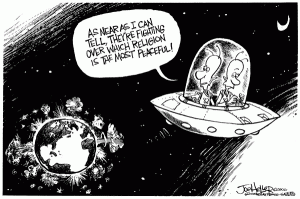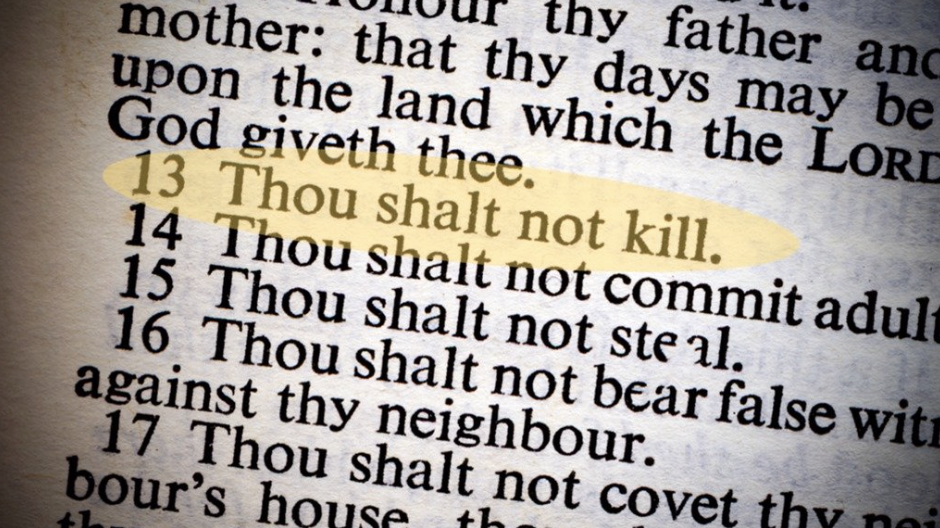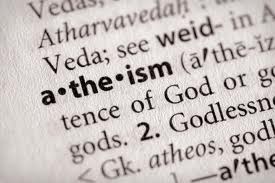 Of the 8,302 atheists worldwide who responded to our survey, 46 per cent think religion is a strong force for bad in the world, 41 per cent think it is a moderate force for bad while 9 per cent think it is roughly balanced in its impact for good and for bad. Only 1 per cent of respondents think religion is a moderate force for good. That’s a pretty poor report card for the public relations efforts of the world’s religious organisations!
Of the 8,302 atheists worldwide who responded to our survey, 46 per cent think religion is a strong force for bad in the world, 41 per cent think it is a moderate force for bad while 9 per cent think it is roughly balanced in its impact for good and for bad. Only 1 per cent of respondents think religion is a moderate force for good. That’s a pretty poor report card for the public relations efforts of the world’s religious organisations!
Despite Australia and New Zealand being two of the most secular countries in the world – countries in which the harsh effects of religious fundamentalism are less apparent than, say, the USA – Australasians are notably more harsh in their assessment of religion’s impact.
Results for Australia and New Zealand are almost identical. Fifty-one per cent of Australians and New Zealanders – a full 5 percentage points more than the worldwide result – think religion is a strong force for bad. Thirty-eight per cent rate religion as a moderate force for bad, 9 per cent think it is roughly equal in influence and, consistent with the overall result, only 1 per cent give religion any credit for being a moderate influence for good.
Forget about religion being bad – let’s talk about the survey question!
Some Australasian respondents were unhappy with the survey question. There are complaints that ‘good’ and ‘bad’ are subjective terms. One critic explains it is a ‘bad question’ because it has ‘many answers’.
Fortunately, many of those answers are supplied in the comments and most respondents seem more than capable of sorting out the difference between ‘good’ (tolerance, diversity, kindness, peace) and ‘bad’ (intolerance, divisiveness, violence). As with my first analysis of the survey data, I was struck by respondents’ determination not to make sweeping generalisations, not to vilify believers and to concede, not only that religion is not all bad but also that there are other, non-religious ideologies which may be equally toxic.
Why Religion is ‘Bad’
Why do 89 per cent of Australasian respondents believe that religion is a force for ‘bad’ in the world?
“9/11!!!!!!!!!!!!!!!” explains one respondent, succinctly.
Certainly, it can be argued that the terrorist attack on the World Trade Center and the Pentagon focused the world’s attention on the dangers of religious fundamentalism and sparked the ‘New Atheist’ movement, inspired by the post-9/11 books of Sam Harris (2004), Richard Dawkins (2006), Daniel Dennett (2006) and Christopher Hitchens (2007). But most survey respondents took a much broader view – both geographically and historically.
“Religion is at the heart of most of the suffering on this planet,” argues a 27 year old Australian male respondent.
Others cite religion as the “root cause of most evil and oppression in the world”, “a retarding force in the struggle for human rights” and the “largest justification for the most heinous acts in the world”.
Religion is “often the primary reason for opposition to science, rational inquiry, gay rights, women rights et cetera” says a fire fighter from Australia. Further, says an Australian psychologist, “The majority of genocide, war, oppression and evil has been carried out in the name of religious beliefs – and still is.”
The elaborations of religion’s sins of commission and omission are eloquently elaborated in the comments on the survey question. Religious war, religious genocide, honour killings, honour rapes, bigotry, racism, slavery are all cited to explain why religion is a force for bad in the world. There are complaints, too, about religion’s ‘anti-scientific barbarism’ and its dogmatic rejection of simple life-saving initiatives such as condoms in AIDS-ridden parts of Africa. Religion’s impact on children is another key theme – especially the indoctrination and enforced ignorance of children and the clerical abuse of children (and its concealment by church authorities). Also mentioned is religion’s massive oppression of women and minority ‘out-groups’ over thousands of years.
Is religion all bad?
Despite respondents’ almost universal belief that religion has a negative impact on the world, there is broad acknowledgement from respondents that the issue is not completely ‘black and white’. Religion is not universally demonised; there are plenty of Australasian respondents who acknowledge that religion performs some useful functions.
For example, a university professor from New Zealand concedes, “While I think the overall effect of religion is negative I see that it can be a cohesive force to give people a sense of belonging.”
Another two Kiwi respondents also give religion credit for some positive influence:
“Religion motivates some people to be more good than they would otherwise normally be.”
“Some churches have the energy in numbers to perform good deeds, irrespective of their misguided belief in the supernatural and mythical figures.”
Similarly, an Australian computational scientist acknowledges that, while religion’s net effect may be negative, it can be positive for some individuals: “Religion is used to justify prejudice and hatred and murder, but it does provide comfort to many individuals.”
“On a personal level,” adds another Aussie, “religious belief can be good for some people. In particular, many find the sense of community comforting. Humans are an extremely social species so it makes sense that anything that fosters strong support networks is a good thing, and religion has traditionally filled that roll.” But, she goes on to explain, “That being said, when we look at the overall impact of religion, we are forced to look at the whole of these organisations. And when we look at the whole, we see religions refusing to consider evidence that refutes their doctrine or dogmas. We see criminal activities covered up purely to save the image of the organisation itself. Religion spreads misinformation, and often where it does this most is among poorer, less educated communities. And it is among these communities that religion is often at its most damaging … ”
The key question considered, and overwhelmingly answered in the negative by respondents is, “Does the good done by religion outweigh the intolerance, self-interest, ignorance, violence and killing done in its name?”
“This question is difficult,” admits an Australian business owner, “… how does one balance the good against the bad? Does a village provided with a clean safe supply of drinking water balance out the rape of children by religious authorities for instance?”
One Australian respondent, now working as a high school teacher, gives an insight from her personal experience:
“In my previous career in international development, I saw religion inspire people to help those in need and a lot of excellent charities are religious. However, it is also the root cause of the oppression of women and lack of access to contraception, advice on prevention of AIDS and abortion for victims of rape, especially in war-torn areas and some refugee camps, where religious organisations are supposed to help not make things worse.”
Others agree:
“Religion certainly contributes to charities worldwide, however they can equally have negative effects on a community and the world through discrimination, abuse, etc,” said one 16 year old respondent.
An Australian business executive adds:
“While there are some individuals who genuinely work for the disadvantaged because they feel that is what religion is about there are many, many instances of the opposite. The Catholic Church has unbelievable wealth but does not use it all for the poor, in fact, it is the world’s biggest slum landlord. Missionaries, while they might provide schools and health, also have to convert people destroying local cultures and communities as a result.”
To be fair, the odd respondent points out that religion is not the only obstacle to a civilised society:
“Not all violence of course is religious, but there is far too much to be ignored, in both Western and Eastern civilisations,” says a 28 year old lawyer from Australia.
“Corporate greed & laissez faire capitalism are one step worse [than religion],” argues an Australian scientist.
Yet another respondent ponders whether religion can be blamed entirely for its faults – perhaps religious fanaticism is the fault of “the culture and society”.
For one respondent, a philosophy post-graduate, blaming ‘religion’ is a cop out:
“… I view religious institutions are purely human institutions which, as a result can be turned in any direction the constituent members wish. To talk of “Religion” having moral culpability is to remove responsibility from those who constitute the religion.”
Many respondents cite ‘tribalism’ as one of the negative effects of religion. But, as one Australian respondent points out, “Religion is only one form of tribalism. I regard nationalism as equally destructive.”
Others freely acknowledge that, as bad as the religious may be, “… there are equally horrible non-believers.”
“People can and do, do bad things in the name of religion, but so do many non-religious people.”
Is religion necessary?
While acknowledging that religion is not ‘all bad’, some respondents insist that the ‘good’ done by religion is not (or need not be) dependent upon religious belief.
The consensus is aptly summarised by an IT programmer from Australia:
“All good forces which stem from religious belief don’t need religious belief to come about, but many bad forces which stem from religious belief could not come about without it.”
“Religion has produced good,” concedes a female lawyer from Australia, explaining that:
“Many charities, et cetera are established and continued through religion, and possibly would not continue to exist in a non-religious world. However equally, religion has often created the problems which the charities need to meet in the first place (e.g. poverty caused by having too many children because of the ban on contraception). However, there is a great deal of evil perpetuated in the world because of religion. And none of the good things in the world rely on religion to exist, they could exist just as much without religion.”
This view is expanded upon by a 30 year old, unemployed Australian respondent:
“Human creativity in the form of say architecture or music does not require religion as a source, the people that create such art are talented regardless of their religion and could therefore have achieved their masterpieces anyway; the only thing religion provided that might otherwise have been difficult to obtain was funding. Other things such as community, charity, et cetera, are demonstrably provided by other organisations or pursuits independent of religion. Thus the positive aspects unique to religion are minimal, while I think the negatives such as war and ‘ethnic cleansing’ outweigh these by far.”
“While religion does give a lot of people hope, there are plenty of secular reasons for people to have hope for the future, and the air of intolerance that many religions create far outweighs any good they have done,” argues a 20 year old tertiary student from Australia.
The point is neatly summarised by another Australian student, “The good caused by religion would occur without it. The bad, in many instances, would not.”
Indeed, the consensus seems to be that:
“Actions which are actually beneficial to society are good whether or not done from religious motivation. But there are many harmful actions which are only done from religious motivation, and have no secular basis; so the net effect of religion on behaviour is significantly harmful.”
Religion’s historical record
In weighing up the net impact of religion on the world, many Australasian respondents consider its history.
As one respondent wryly observes, “Looking at history, religion has a lot of explaining to do…”
“Religion can be used to motivate people to perform both good and bad acts. Religion has been the root of wars and suffering, but it has influenced very important cultural developments (for example, the development of the courts of equity in England based on Christian morals as opposed to common law). It has been used both to oppress and to free the oppressed. Overall, it is a human tool, and has been used for both good and bad accordingly, ” says a 19 year old Australian student.
A similar historical perspective is offered by a retired public servant in his 60s:
“In the past religion offered a moral framework for life necessary in what were often barbarous times. In an evolved society where people are educated to understand the need to behave in certain ways, for the common good, and where the rule of law and a functioning democracy exist, it is less necessary and can impose or support values that are out of date, for example, strictures denying the rights of women and homosexuals.”
An engineering manufacturer from New Zealand also argues that religion once served an important purpose but is now redundant:
“In tribal times, religion or superstition, would serve to bond groups and increase the survival rate of that group, so it may be that religion is an evolutionary selected trait and in that sense it is a generally positive influence. However, most religions have failed to match the evolution of human morality. Therefore, where it may have had, in the deep past, a weak or strong positive influence on the group survival, in this age, its net negative influence on actions and morality has a strong negative impact: sowing division, anti- scientific attitudes, prejudice and distrust of others in such measure as to outweigh the small positives such as charity work or solace of those in need.”
A retired university lecturer in biological and environmental sciences sums up the argument, noting that, “In the course of human history, perhaps religion was something humans ‘had to have’ in order to structure societies, but the civilised world has surely moved on.”
Religion and Power
Many respondents draw a strong connection between religion and political power, arguing that religion is a “strong force for bad” because it is “a method for subduing the population by those in power.”
“Religion would be a neutral force but for the fact that people in power direct its use for their own ends,” notes one respondent.
And, where there is power there is also corruption. As an Australian pharmacist observes:
“Although some examples of religion led altruism exist, religion has always been tied to power and therefore attracted the corruptible in the exercise of that power.”
In religion, says a female respondent from Australia, “I see more of a quest for control and power than genuine attempts to help fellow human beings/animals/the planet/society …”
A semi-retired academic researcher agrees:
“To me, religion (and here I mean organised religion, whether large- or small-scale) is simply about power. It’s just an elaboration on shamans / priests couching what they want to say as ‘this is what the gods say’.”
“It’s a tool of control that uses fear and division,” says another.
“Specifically, religion exerts pressure on politics, making the world a worse place for everyone in it. Think ‘gay rights’,” an Australian education assistant complains.
An Australian retiree with a post-graduate degree agrees, “[Religion] actually stops things from being legalized that the majority of people in society want legalized (eg. voluntary euthanasia).”
Others note that the continuing religious influence on political leaders burdens the country with unwarranted economic costs. For example, an Australian sommelier notes that:
“Apart from historical evils (crusades et al) and distant evils (the non-proliferation of condoms in Africa, with the resultant proliferation of AIDS) and secret evils (the rape and torture of children by figures of authority) we have obvious, ‘hidden in plain sight’ evils, including but not limited to retarding societal discourse on a range of topics, the witch-hunting that goes on in political-scientific circles, and the vast sums of money that disappear from our economies due to religious tax exemption, resulting in a crucial reduction in the average standard of living where a slight difference would have most impact – at the poverty line.”
“The ‘Advancement of Religion’ should not be a worthy pursuit,” says a defence worker from Australia, referring to the basis upon which religions are assigned charitable/tax exempt status, regardless of whether or not their efforts are truly directed towards genuine charity.
Other respondents observe that, in power struggles, religion has always tended to support the status quo.
“Religion’s positive contribution is related to creating communities, outreach to the elderly, alms for the poor, shelter for the homeless and orphans,” says an artist and gallery owner from Australia. “The negative influence in the world is that it also tends to side with the kings and the powerful as it views supporting the marginalized and the poor as tantamount to socialism/communism. Churches have always opposed social reform, repeal of abortion laws, access to contraception for all, perpetuating genderism, et cetera.”
Religion and the Individual
Of particular concern for some, is the negative effect of religion on individuals – particularly children.
“Religious leaders see nothing wrong with indoctrination, says a retired manager from Australia citing the “Jesuit idea of, ‘Give me the child until the age of seven…”
“People don’t seem to get as passionate about anything as they do about religion, and will kill for it,” a physiotherapy student observes. “Religion teaches people to have unquestioning obedience which makes abuse a lot easier. Religion also teaches people not to think critically and to accept things without evidence which makes them gullible. Disagreements over religion cause so much harm on individual and global levels.”
“The main problem with all religions is that they delude people into believing things without verifiable evidence,” explains a retired Australian biology lecturer. “As a result, religion has caused much intolerance and violence throughout history.”
“Religion poisons people’s minds and enslaves them,” says another respondent.
“In my experience,” observes a retired teacher from New Zealand, “good people can become bad and unkind under the influence of religion.”
An aircraft mechanic from Australia agrees, noting that, “religion seems to bring out the worst in people”.
“… [religion] utterly destroys people’s clear thinking abilities; that is a massive bad,” says one respondent.
“Divine authority overrides peoples’ own sensible moral decisions,” complains an Australian artist. “Terrible actions (such as ethnic genocides) are justified as ‘God’s will’, overriding any and all sense of conscience,” adds a 21 year old student from New Zealand.
“Religious belief is one of the few influences that can cause people to behave in excess of what would be their normal moral limits,” says a retired teacher and education bureaucrat, echoing the Nobel laureate, Steve Weinberg’s oft-quoted maxim: “With or without religion, good people can behave well and bad people can do evil; but for good people to do evil—that takes religion.”
Divisiveness
Another recurring theme in the respondents’ answers was the divisiveness of religion:
“Religion is by its very nature divisive …” says a 29 year old nightclub manager from Australia.
“Nothing divides humanity more,” agrees an Australian human resources manager.
A music store manager goes on to explain: “The basic stance of religion is the assumption that the believer has sole access to ‘the truth’ which means that any other belief – or lack of belief – is wrong. This inevitably leads to conflict, violence, and persecution.”
Religion “… creates a huge ‘us and them’ atmosphere that leads to hate and xenophobia,” says a New Zealand scientist. “It’s a dividing force, encouraging prejudice against those of other faiths and creating more in group vs out group dynamics,” adds a 29 year old Australian respondent.
The argument here is summarised by the manager of an Australian family business:
“Religion by its very nature creates divisions, some more extreme than others. Allowing true secularism is the only way to respect all people, even when it comes to ‘mild’ religions.”
What is the net impact of religion on the world?
A succinct summary of the responses to the survey question addressing the impact of religion is provided by a ‘starving writer’ from Australia:
“Getting rid of religion would not solve all of the world’s problems, but at least we could attempt to tackle them without reference to things and beings that do not exist.”
Respondents, generally, acknowledge that, “There are good religious people, even folk who do good things because they are religious, but religion as both organisations and modes of thought are immensely destructive.”
As a 36 year old stay-at-home mother from Australia argues:
“Illusion is not the answer to doing good in the world – we need to know as much as we can about the true nature of reality in order to make rational choices about good and bad. Female and male genital mutilation is unnecessary and causes lifelong pain. Beheadings, burnings, et cetera are barbaric and cause much harm. We need to be humane in our response to crime or cultural transgressions. Women need more freedoms in the world generally and not to be seen as possessions of men. Religious views prevent these progressions taking place.”
The final word goes to a mature-age, female university student from New Zealand:
“… at times religion is a major source of evil and at other times it can be harmless or even encourage good deeds … but it seems that religion generally tends to do more harm than good.”
It seems that the vast majority of the world’s atheists (at least according to our survey) agree.
Chrys Stevenson







